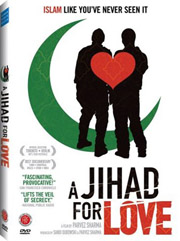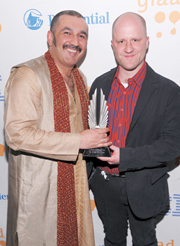Make Love, Not Jihad
If you think being a gay Christian is tough, try being a gay Muslim.
By Leigh Bell
Editor’s note: Parvez Sharma sat down with OutSmart‘s Leigh Bell for this interview in June 2008, when he was in Houston for a screening and discussion of A Jihad for Love.
 Parvez Sharma smokes cigarettes like he makes films: dramatically and without excuses. He inhaled an American Spirit with vigor outside the Angelika Film Center downtown as he discussed his first and controversial documentary, A Jihad for Love. The film chronicles several gay and lesbian individuals who struggle to be accepted by Islam in countries—like Egypt and Iran—where religion is unyielding and homosexuality is punishable, even by death. Some of these people were imprisoned, beaten, and eventually driven from their
Parvez Sharma smokes cigarettes like he makes films: dramatically and without excuses. He inhaled an American Spirit with vigor outside the Angelika Film Center downtown as he discussed his first and controversial documentary, A Jihad for Love. The film chronicles several gay and lesbian individuals who struggle to be accepted by Islam in countries—like Egypt and Iran—where religion is unyielding and homosexuality is punishable, even by death. Some of these people were imprisoned, beaten, and eventually driven from their
homelands.
As a gay Muslim from Egypt, Sharma was touched in unexpected ways during the six-year filming process. He is both filmmaker and activist traveling nationwide this fall with A Jihad for Love to conclude each showing with an in-person, upfront discussion about religion and homosexuality. Oftentimes, these talks involve panels with various leaders in the community, both pro- and antigay. Houston was the second stop on his grueling tour of 35 cities.
Most filmmakers don’t follow a documentary around. What inspired you to do it?
I’m implementing a grassroots distribution of this film. Once filmmakers get distribution, they feel that their job is done, but I actually feel that once you get distribution, that’s when you have to work the hardest. . . . I have the responsibility to make sure people leave the darkened theater with something quite profound, with questions, and maybe with some answers, and a renewed feeling to change things.

Were you first filmmaker or activist?
I was first a filmmaker but, in making this documentary, I also realized I was an activist. I believe very fundamentally that films are the most potent tool for social change, because people engage with cinema like they engage with nothing else. I want to milk the medium as much as I can to create debate and change around religion and homosexuality. For me, some of our last and most bitter battles are going to be fought on the frontlines of religion.
You confront your own religion, Islam. How did you do it with such grace?
Look, you’re not going to get any kind of religious opinion coming from the pope saying homosexuality is okay. When you’re battling homophobia in religious communities, you have to work with respect and you have to work very slowly. You can’t present theological arguments with contempt. You have to present it to people within religious orthodoxies with this idea that our stories are about people being denied love.
These days, “jihad” is related to terrorists, and you even mentioned that some of your financial backers asked the word be removed from the title. Why did you fight to keep it there?
I thought it would be so amazing to take the word (which America incorrectly translates as only meaning “religious war”) and put it next to the word love. . . . “Jihad” entering the minds of audience members as an internal struggle, at least how my film describes it, is a huge victory for me.
This film took forever to make, right?
It took over my entire identity for six years. . . . We had 400 hours of film in nine languages. I started editing in February 2006 and finished August 2007. [The current edition is almost 90 minutes, but many additional takes are included in the DVD.]
Whose story of those you filmed touched you the most?
Mazen [an Egyptian imprisoned and tortured along with 52 other men in 2001 when government officials raided a gay club. He won asylum in France, where for a while, he lived homeless and sometimes dirt poor]. I felt Mazen’s anguish in the pit of my stomach. I have held him while he cried for hours. . . . I don’t know any gay person who has gone through that intense pain for being a gay person.
Has that divided the American gay population?
Even this minority has divided itself into minorities and judges one another based on skin color or what you look like. . . . I would want every gay man in every gay bar to come and see this film, to see that it is possible to be religious and gay, to see that it is possible to be a victim of torture.
A Jihad for Love DVD: English and Arabic with English subtitles. From First Run Features (firstrunfeatures.com).
Leigh Bell also talks to author Billie Willmon Jenkin in this issue of OutSmart.











Comments